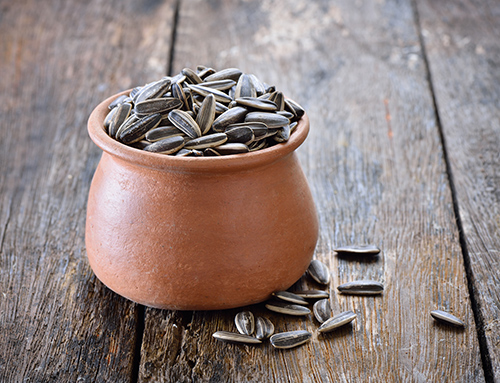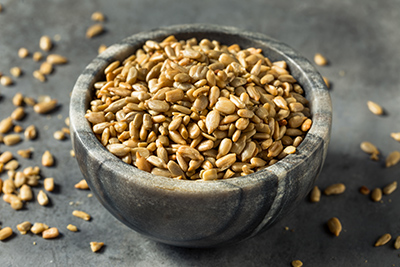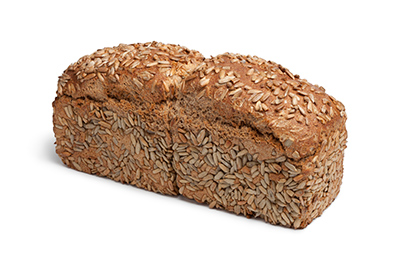Contents
Primitive people in Mexico knew the benefits of sunflower seeds centuries before the West discovered their actual dietary and medicinal values. Each sunflower comprises thousands of tiny flowers, which produce an equal number of highly nutritious seeds.

Sunflower Seeds Nutritional Facts
Sunflower seeds comprise up to 49.6 percent fat, an excellent culinary oil protein comparable to meat, and 8.3 percent carbohydrates. They are almost absent in vitamins C and A, but they are one of the wealthiest sources of vitamin E (exceeded only by almonds) and vitamin B (surpassed only by brewer’s yeast and wheat germ).
They are plentiful in minerals such as iron, magnesium (6.8 mg/100 grams, equal to lentils), calcium, and phosphorus. It is possible to deduce that sunflower seeds are among nature’s most nutritionally concentrated foods, mostly in fats, minerals, and vitamins E and B1. Even with this nutritional richness, they are easily digested only if well chewed.
Sunflower seeds are oil-bearing nuts with the lowest saturated fatty acids, making them especially advantageous in lowering cholesterol. They are also abundant in lecithin, a fat (phospholipid) that reduces blood cholesterol.
Benefits of Sunflower Seeds
Consuming sunflower seeds frequently (unsalted, of course) is especially indicated in the following situations:

Arteriosclerosis and coronary heart disease – The solidifying and contraction of the arteries because of cholesterol deposits on their walls is the leading cause of stroke, heart attack, and inadequate circulation to the limbs. The essential fatty acids in sunflower seeds (specifically linoleic acid) hinder the development of arteriosclerosis by decreasing blood cholesterol levels. Furthermore, they foster PROSTAGLANDIN E1 creation in the body, which is a physiologically essential substance that provides the following benefits:
- Dilates the blood vessels
- Reduces the stickiness of the platelets, which clump to form clots

Sunflower seeds contain copious quantities of vitamin E, a potent antioxidant that inhibits arterial corrosion. It also decreases platelet stickiness, which helps avert heart attacks and blood clots.
Excess cholesterol—Eating sunflower seeds significantly reduces cholesterol levels, particularly as a substitute for other fatty or calorie-rich foods. The same result is achieved by using sunflower seed oil.
Skin and related disorders – Linoleic acid and vitamin E improve the skin’s elasticity, shielding its cells from the impacts of aging (antioxidant action). Consuming sunflower seeds is suggested for dermatitis, cracked, dry skin, and eczema. They also bolster the hair and nails, lessening the number of gray hairs. Dr. Schneider affirms that an emulsion of sunflower seeds gives good outcomes as a substitute for milk for infants suffering from infantile eczema.

Nervous disorders – Sunflower seeds contain as much vitamin B1 as wheat germ, surpassing every other food except brewer’s yeast. Because they also contain phosphorus, lecithin, and linoleic acid, they are an excellent food that benefits the nervous system, particularly the brain. Those suffering from stress, insomnia, depression, or nervousness will find real help in these modest seeds.
Diabetes—People with diabetes tolerate the benefits of sunflower seeds, a nutritious food that should be included in their diet. A study in Finland showed that those with low vitamin E intake are at four times more risk of contracting diabetes than those with copious quantities of this vitamin. Sunflower seeds’ elevated level of vitamin E plays a role in preventing diabetes and stopping its progression.
Increased nutritional needs – Sunflower seeds are high-calorie and rich in crucial nutrients. They are suitable for lactating or pregnant women, athletes, those with anemia, those undernourished, those recovering from devastating diseases, and usually, anyone needing a more exceptional supply of nutrition.
Cancer – Numerous epidemiological and experimental studies show that vitamin E has an anticarcinogenic effect and sometimes offers a cure. Because of the large quantity of vitamin E in sunflower seeds and their impressive nutritional power in terms of proteins and fats of high biological value, they are an ideal food for those struggling with or at risk of cancer. Their richness in minerals such as iron and magnesium makes them even more appropriate, if possible.
Sunflower Seeds Scientific Facts

- Scientific Name – Helianthus annuus L.
- French – Graine du tournesol.
- Spanish – Semillas de girasol.
- German – Sonnenblumenkerne.
- Description—Sunflower seeds, an annual plant of the botanical family Solanaceae Compositae, grow to two meters.
- Environment – Originally from subtropical regions of the Americas, like Mexico, the sunflower is now cultivated worldwide.
Eating sunflower seeds is beneficial to those suffering from arteriosclerosis or coronary heart disease, but two things must be kept in mind:
- To maximize the benefits of sunflower seeds, they must not be salted since excess sodium fosters arterial contraction and the deterioration of arterial walls.
- Sunflower seeds should not be eaten “in addition” to the regular diet but as a substitute for other foods, as if they were another dish. This prevents taking an excess of calories, which may worsen arteriosclerosis.
The best approach is to eat sunflower seeds while reducing calories by eliminating foods rich in saturated fats such as butter, cheese, fatty meats, and sausages.
How to Use and Prepare Sunflower Seeds
- Raw – Sunflower seeds are best eaten raw after they have been spread on a flat surface and dried for a few days.
- Toasted – These are very flavorful, but their nutritional value suffers if they are toasted for an extended period.
- Ground to a paste – Once shelled, the seeds are ground to a homogenous paste, which is superb for children, the elderly, and those with weakened teeth.
DISCLAIMER: All content on this website is presented solely for educational and informational objectives. Do not rely on the information provided as a replacement for advice, diagnosis, or treatment from a qualified medical expert. If you are pregnant, nursing, or have any preexisting medical concerns, talk to your doctor before using any herbal or natural medicines.
REFERENCES
- George D. Pamplona-Roger, M.D. “Encyclopedia of Foods and Their Healing Power.” George D. Pamplona-Roger, M.D. Encyclopedia of Foods and Their Healing Power. Trans. Annette Melgosa. Vol. 2. Chai Wan: Editorial Safeliz, 2005. 105, 106, 107. Print.
- Healthline – https://www.healthline.com/nutrition/sunflower-seeds
- WebMD – https://www.webmd.com/diet/health-benefits-sunflower-seeds
- PharmEasy Blog – https://pharmeasy.in/blog/health-benefits-of-sunflower-seeds
